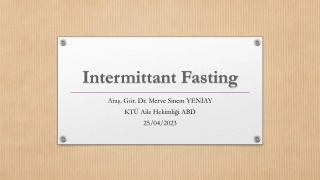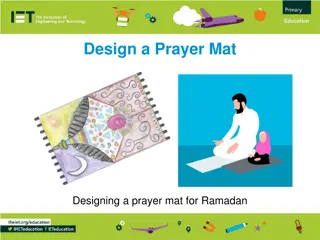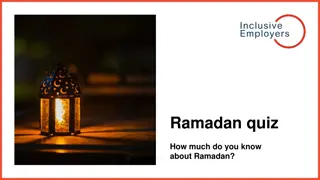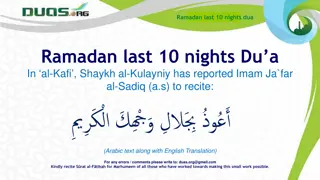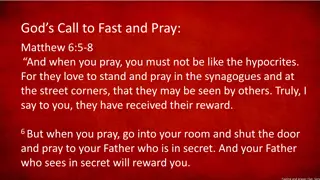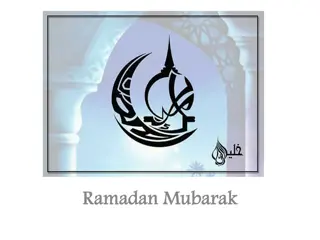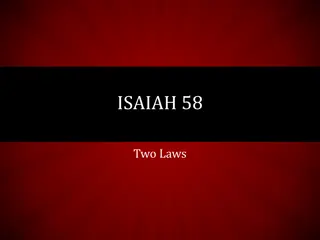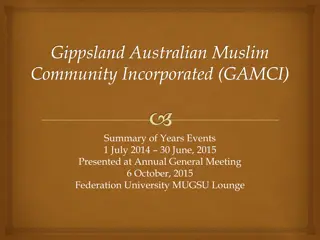Understanding Ramadan: Fasting, Laylat-al-Qadr, and Taraweeh
Ramadan is the 9th month of the Islamic calendar, marked by strict fasting from sunrise to sunset, spiritual reflection, increased devotion, and worship. The significance of fasting in Ramadan is to gain Taqwa (god consciousness) through self-discipline, sacrifice, and empathy. The last ten nights of Ramadan include Laylat-al-Qadr, a night of decree better than a thousand months, and Taraweeh prayer, a special practice during Ramadan nights.
Download Presentation

Please find below an Image/Link to download the presentation.
The content on the website is provided AS IS for your information and personal use only. It may not be sold, licensed, or shared on other websites without obtaining consent from the author. Download presentation by click this link. If you encounter any issues during the download, it is possible that the publisher has removed the file from their server.
E N D
Presentation Transcript
ICNEF PRESENTATION BY YUSUF SHAUIB
WHAT IS RAMADAN Ramadan is the 9th month of the Islamic calendar. Strict fasting is observed from sunrise to sunset. It is the month the Quran was revealed. It is the time of spiritual reflection, self- improvement and increased devotion and worship. Muslims put more effort into following the teachings of Islam, with the hopes of continuing these actions for the rest of the year. Allah says in Quran Surah al Baqarah, ayah 183 O you who have believed, decreed upon you is fasting as it was decreed upon those before you that you may become righteous. It was prescribed in 2 AH. Ramadan is also a restraint for all negative words uttered or negative content viewed. It is also a time to abstain from pleasure. Ramadan is the time when the gates of hell are closed, the Shayatin chained, and Gates of Jannah are wide open.
WHY WE FAST IN RAMADAN When we think of why we fast, many people answer that it is to relate to the poor. But that is the least of the reasons. The real reason we fast is to gain Taqwa ( god consciousness). Fasting is one of the five pillars of Islam. Allah says of the fasting person, He has left his food ,drink and desires for My sake, the fast is for Me so I will reward the fasting person for it and the reward of good deeds is multiplied ten times. Fasting teaches us to practice self discipline, self control, sacrifice and empathy for those who are less fortunate, thus encouraging actions of generosity and compulsory charity , zakat.
LAYLAT-AL-QADR (THE NIGHT OF DECREE) The last ten nights of Ramadan is a blessed time. Just as Allah has chosen the most sacred month, days, and other occasions in a year, the last ten nights have a single odd night that is better than a thousand months of worship. This was the night the Quran was first reveled. Allah says in the Qur'an, The Night of Decree is better than a thousand months, (Qur'an, 97:3). The Prophet (PBUH) said, Whoever prays on Laylatul Qadr out of faith and sincerity, shall have all their past sins forgiven, (Hadith, Bukhari and Muslim). It was originally prescribed because the Sahabah wanted to match good deeds with the people who had lived for hundreds of years in the past. It is also the time where the direct future can be changed by Dua. Angels numbering more than earth s pebbles descend down to earth upon God s worshippers. This was the night the Quran was first revealed.
TARAWEEH Taraweeh prayer is one of the remarkable specialties of Ramadan nights. Taraweeh means rest and relaxation . Qiyam al Layl in Ramadan after Isha is called Taraweeh. Taraweh is sunnah mu akkadah (confirmed practice of our beloved prophet (PBUH). In the last year of the Prophet s life, he came out one night and prayed taraweeh. On that night, some people prayed with him. during the second night, word spread and more people joined in taraweeh. Even more people attended on the third. On the fourth night, the masjid was packed and the people awaited the Prophet s arrival. The Prophet, however, prayed at home by himself. after Fajr, he said: Nothing prevented me from coming out to you except the fact that I feared that it would be made obligatory for you. (Muslim)
BATTLE OF BADR (THE DAY OF THE CRITERION) The Battle of Badr took place on the 17th Ramadan of the 2nd year of the Hijrah at the wells of Badr. The Muslims had only 313 soldiers. This is the same numbers of Messengers among the prophets, and the same number of troops in Talut s army when they fought Jalut. But Allah promised them 1000 angels to fight against the 1000 Makkans. The Muslims won the fight with the help of Allah. Mus ab ibn Umayr reported: I was among the prisoners of war on the day of the battle of Badr. The Messenger of Allah, peace and blessings be upon him, said, I enjoin you to treat the captives well. After I accepted Islam, I was among the Ansar and when the time of lunch or dinner arrived, I would feed dates to the prisoners, for I had been fed bread due to the command of the Prophet . In another narration by Ibn Abbas s wife, Abu Sufyan and Abu Lahab were sitting in her house while she and a servant were present. When Abu Sufyan recounted the events of Badr, he said that there were men on white men on white and brown Horses, and before we could look, we were overwhelmed. When the servant heard this, he began to cheer, "The Angels, The Angles, Allah Has sent the Angels. . Hearing this, Abu Lahab began attacking the slave. At the same time Ibn Abbas s wife came with a wooden pole and smacked him of the head so hard that the pole shattered, and Lahab s head cracked. Then she said, Is this how a noble acts as a guest in a house. Abu Lahab later died from the wound.


